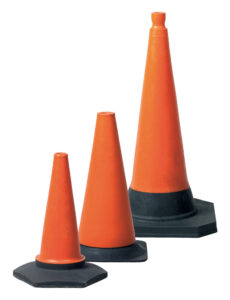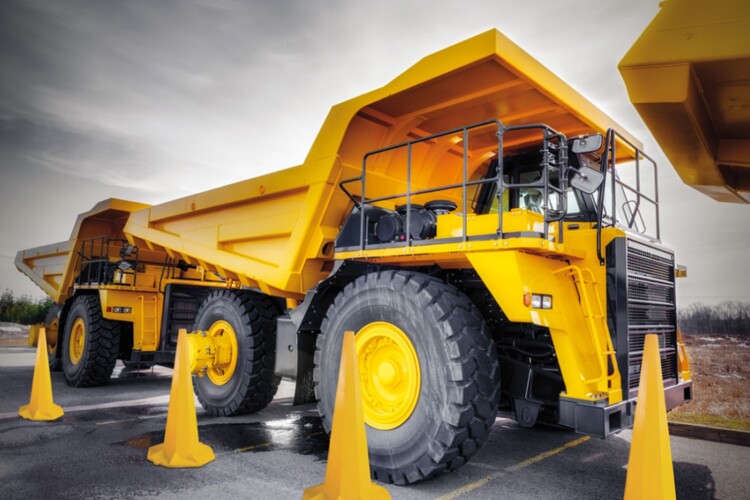Although you may have seen many a fuel truck with three or more heavy-based cones neatly tucked in a holder at the rear of the truck, you most probably have not given much thought to the manufacturing, origin, and plethora of uses associated with these cones. Read on as we discover the origins and applications of these heavy-based orange cones and more on related road safety products.
Where the Idea Originated and How the Design Evolved into Heavy-Based Cones
Roadworks pose a hazard to motorists, truck drivers, and pedestrians alike. This has always been the case. Even when a worker paints the median line, they are at risk of being run over. The motorists are also in danger as they have to pass the worker safely without causing harm while their evasive actions may put other motorists in danger.
It is thus not a surprise that a road worker, tasked with painting road signs and lines on the road surface many years ago thought of heavy-based cones to warn motorists, direct them around the wet paint, and in a way keep the workers safe because they become more visible. Before then, road maintenance crews had to use heavy lantern carrying wooden tripods to warn motorists of the hazards and direct them around open ditches and other hazards associated with road construction. At that stage, concrete blocks were also widely used.

The heaviness of the concrete and the wood made it difficult to quickly deploy the temporary warning and redirection devices. The weight also made it difficult and expensive to transport. The introduction of hollow, yellow, red and orange cones thus made a huge difference. The very design made it possible to stack the pylons to take up less space when transported. Being stackable, the pylons could easily be deployed by a single person carrying a stack. With less space taken up in transport, roadworks companies saved money as they could transport other equipment along with the pylons.
The lightweight design was the next evolutionary step. The lightweight characteristic implied lower transportation costs, easier deployment, quicker collection and fewer people needed to remove or put cones in place. However, the lightweight design posed a problem. Wind could easily blow over the pylons and did so. Cones flying around in windy conditions certainly add a risk factor to road usage. It seemed as if the very design characteristic that made the pylons perfect for quick deployment and easy storage was the flaw that would make it impractical to deploy the pylons on roads where even the wind from passing vehicles could blow over the devices.
What was needed was something that could hold the cones in place without moving away from the hollow pylon design. This is where the heavy-based pylons came in. With the same design as the conventional pylons, these cones have heavier base structures that keep them grounded in normal conditions. This means the wind from passing vehicles doesn’t cause the pylons to blow over. Fortunately, the base structures are just heavy enough to provide superb stability, yet light enough to ensure easy deployment, low transportation costs, no need for machines to deploy, and less storage space needed.
Armco Superlite supplies the heavy-based orange cones in different sizes as part of the brand’s large range of road safety products. These pylons are made to be strong and suitable for the harsh South African road conditions. With the longevity of these pylons comes the benefit of the devices being economical. Made from PVC, the pylons cannot rust. The pylons are coloured through the use of UV-resistant ink, minimising the risk of premature fading as the result of exposure to sunlight.
The company supplies the pylons in different colours, the Dayglo Orange being the most popular. Both soft and heavy-based types are available. The soft types are suitable for applications such as:
- Sport – to demarcate goalposts or hazards around which the athletes must navigate.
- Events – to show where people must wait in line.
- Shopping malls – to indicate wet floor areas.
Different sizes are available, including the monster-size types for usage at mines and other sites where exceptionally large vehicles operate.
Why is Dayglo Orange the Most Popular for Road Construction Applications?
Orange has been shown to be one of the best contrasting colours in low-light conditions. Orange is highly visible even at night. With the Dayglo effect, the pylons are also exceptionally visible when vehicle lights shine on them. It is possible to add reflective strips to the pylons to improve visibility even more.
Where the Heavy-Based Orange Pylons are Used
Apart from serving to warn motorists of road construction work, the pylons are deployed to merge one or more lanes, to direct motorists around hazards and to indicate areas where they may not drive. These pylons are not meant to stop or prevent motorists from driving in a certain area. Instead, they serve as gentle redirection devices. If hit by a vehicle, the pylon simply moves out of the way. This means no damage to the vehicle. It is this characteristic that makes these pylons suitable for applications where they serve to reserve parking spaces for disabled motorists or VIP guests.
The smaller types are often deployed at accident scenes to direct motorists around the debris, vehicles, and possible injured parties. The same types are used by truck drivers to indicate that their vehicles are stationary next to the road. In these instances, they place the pylons a certain distance from the vehicle to give motorists ample time to identify the hazard and to take appropriate steps in avoiding it.
Why Buy from Armco Superlite?
The firm has an international footprint and is best known for the W-beam guardrail systems, which prevent motors from colliding with non-forgiving objects adjacent to the road. These rails serve to absorb and disperse the kinetic impact energy and thereby reduce the force of impact on the straying vehicle and its occupants. The guardrails include the posts which are planted in the soil, the W-beam steel barriers attached to the posts, the end terminals and the delineators, which serve to make the barriers highly visible at night.
The company is known for superior-quality products and strict adherence to international and local manufacturing and safety standards. By purchasing from the local supplier, companies support the South African economy while also saving on the costs of imports. With excellent product warranties, clients have the assurance that they will get product support, competitive prices and devices that are made for South African road conditions, which comply with the requirements of the Department of Transport.
Other Road Safety Products Available from Armco Superlite
Another benefit of buying from Armco relates to the wide range of products available, helping to reduce the administrative load of ordering relevant road safety products. Some of the products available are briefly discussed below.
Delineators
As with the heavy-based cones, the delineators serve to warn motorists about temporary hazards associated with roadworks. They also show on which side the hazard is and on which side to pass. The delineators are applied to direct the motorists around the hazards, to merge lanes temporarily, and to indicate the safe driving path. These devices are made to be lightweight and to take up as little as possible surface space. The unique design makes it possible for the blade attached to the base to return to the upright position after the impact of a vehicle. These devices can withstand several such blows and are thus economical to deploy at road construction sites. The lightweight feature makes it economical to transport the delineators. One person can deploy the delineators without the need for special machinery. The delineators have black and yellow blades for maximum visibility.
Water-Filled Barriers
A third road safety product often used in road construction projects is the water- or sand-filled yellow plastic barriers. Made from exceptionally durable materials, the barriers are lightweight enough for deployment without special machinery. The barriers can be interlocked to form a long barrier in front of the hazard. They can be filled with water or sand to give them maximum stability and prevent them from being easily moved by winds.
Final Thought
Many other types of road safety products are available from Armco Superlite. Get in touch for a quote on the heavy-based cones and related products for your municipality’s next road maintenance project anywhere in South Africa.

